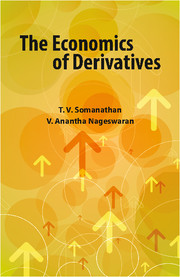Book contents
- Frontmatter
- Dedication
- Contents
- List of Tables, Figures and Boxes
- Foreword
- Preface
- Acknowledgements
- 1 Introduction
- 2 Definition and Typology
- 3 The Economic Functions of Derivatives Markets
- 4 Market Completion
- 5 Derivatives and Price Stabilization
- 6 Derivatives and Price Destabilization
- 7 The Effects of Derivatives on Prices of the Underlying: A Synthesis
- 8 Causes of the Rapid Growth in Derivatives Trading: A Historical Perspective
- 9 The Role of Derivatives in the Global Financial Crisis of 2008
- 10 Models and their Effects on Markets
- 11 Derivatives and Emerging Markets – Part I
- 12 Derivatives and Emerging Markets – Part II
- 13 Regulation of Derivatives
- 14 Derivatives and Development: A Critique
- 15 Regulatory Policy for Derivatives: A Pragmatic Approach
- Index
- About the Authors
5 - Derivatives and Price Stabilization
Published online by Cambridge University Press: 05 May 2015
- Frontmatter
- Dedication
- Contents
- List of Tables, Figures and Boxes
- Foreword
- Preface
- Acknowledgements
- 1 Introduction
- 2 Definition and Typology
- 3 The Economic Functions of Derivatives Markets
- 4 Market Completion
- 5 Derivatives and Price Stabilization
- 6 Derivatives and Price Destabilization
- 7 The Effects of Derivatives on Prices of the Underlying: A Synthesis
- 8 Causes of the Rapid Growth in Derivatives Trading: A Historical Perspective
- 9 The Role of Derivatives in the Global Financial Crisis of 2008
- 10 Models and their Effects on Markets
- 11 Derivatives and Emerging Markets – Part I
- 12 Derivatives and Emerging Markets – Part II
- 13 Regulation of Derivatives
- 14 Derivatives and Development: A Critique
- 15 Regulatory Policy for Derivatives: A Pragmatic Approach
- Index
- About the Authors
Summary
…In this way, speculators transfer resources from less to more urgent uses. The difference between the prices at which they sell and buy is their margin, which must cover costs of storage and furnish their remuneration. The excess over storage costs is a payment for specialized skill in knowing when to buy and when to sell and perhaps also for bearing risk.
Milton FriedmanFor decades, the role of futures markets in stabilizing or destabilizing prices on the spot market has been a subject of much controversy, not only among economists but also with the general public. What used to be a controversy about futures trading has, with the growth of new and more complex derivatives, become a controversy about derivatives in general.
Price stabilization, as mentioned in Chapter 4, is claimed by some economists to be one of the useful economic functions of futures trading in particular and, by extension, of derivatives in general. This chapter looks at how derivatives influence spot prices and at the theoretical basis for derivatives to exercise a stabilizing influence on prices. It then touches upon empirical studies supporting this view.
Do derivatives affect spot prices?
The first question that arises is whether and, if so, how transactions in the derivatives markets affect prices on the cash (spot) markets. After all, the overwhelming majority of derivatives transactions does not result in receipt or delivery of the underlying. The transactions are settled between the two parties merely by paying up the net price difference. Many economists and laymen have often compared the derivatives markets to mere betting markets and indeed (as was seen in Chapter 2) there are good reasons to compare them. Let it be supposed that there are bookmakers who take bets on the outcome of a football match. Clearly – and assuming there is no ‘match-fixing’ by players or coaches – the bets on the game must have no effect whatsoever on the outcome of the game.
- Type
- Chapter
- Information
- The Economics of Derivatives , pp. 44 - 57Publisher: Cambridge University PressPrint publication year: 2015



